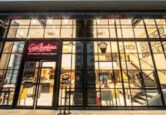Caffè Barbera Su Forbes Middle East
Enrico Barbera, CEO di Barbera e fondatore del nuovo concept di franchising aziendale, ci rivela come è avvenuta la rapida espansione del brand e il profondo legame tra il marchio e il Medio Oriente.
Comincia così l’articolo che Forbes Middle East ci ha dedicato, una speciale intervista che racconta la storia di Caffè Barbera e come si sia arrivati ad aprire il primo store a Dubai.
Finding it easy to stand out among a sea of low-taste, rapid-turnover American-chains, there is a new high-quality concept in coffee spreading across the Middle East. One bringing a 150-year-old taste of Italy to the region’s dedicated coffee lovers.
Beginning on the streets of Southern Italy in 1870, the Barbera family’s special roasted coffee was created by Domenico Barbera, who was the great-great-grandfather of the company’s current CEO. The rich aroma brought customers from miles around, earning him the nickname “the magician”. Generations later, and the now-global coffee brand still carries the magician logo in honor of its founder. The blend remains a closely-guarded mystery, with only three people in the company aware of its secrets.
For 150 years, the Barbera family specialized in roasting and trading its coffee across the world. Today it exports to 63 countries globally. Then, in 2004, Enrico Barbera, the fifth-generation leader of the company, introduced a new direction—exploring the creation of a global coffee house community and launching a pilot store in Dubai with the name of Café Barbera—The Italian coffee house.
Over the next five years, Barbera adjusted the business model and educated himself and his team in the craft of franchising, regularly flying to the US to learn from specialist consultants. In 2008, the company began to widely promote its international franchise model. Café Barbera has now opened stores in Italy, the UAE, KSA, Iraq, the Philippines, Oman, Pakistan, Brazil, Mexico, Ukraine, Sudan, Somalia, Jordan, Morocco and the US. This year will see another 20 locations added, including Kuwait, Bahrain and the UK…
Continua sul sito di Forbes Middle East

 Spanish
Spanish English
English Deutsche
Deutsche



